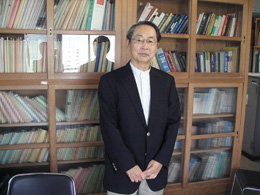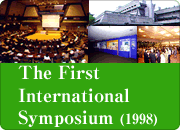Kyushu University &
Prefectural University of Kumamoto
Michihiro Sugano
Born in Kurume, Fukuoka Prefecture in 1933.
Obtained PhD in Agriculture from School of Agriculture, Kyushu University.
Worked at Harvard University (Postdoctoral research Fellow of Nutrition, School of Public Health)
Professor, Laboratories of Nutrition and Food Science, School of Agriculture, Kyushu University
Professor and Dean, Faculty of Life Sciences and Faculty of Environment and Symbiotic Sciences, Prefectural University of Kumamoto
President, Prefectural University of Kumamoto
Professor Emeritus, Kyushu University
Professor Emeritus, Prefectural University of Kumamoto

I was born and raised in Kurume, Fukuoka Prefecture. Japan went to war when I was in elementary school and the times were tough. Around that time, my father, who worked for a Western apparel company, found he had diabetes and started taking insulin, but everything was hard to come by in those days and his condition was compounded by a lack of nutrition. He died shortly after war’s end. I recall our house burning down just five days before the war ended. Being a kid, just feeding myself required my total attention so I didn’t have time to think about my future career. My interest in nutrition began largely because of the difficulty in obtaining foods, but the trigger was a classmate of mine who said jokingly to me during a conversation about careers that if I “pursued agrochemistry, we could drink sake.” So, a simple crack set me on a path in nutritional sciences through the Department of Agricultural Chemistry.
After completing my doctorate, I went to Harvard to study where I was engaged in the nutritional control of cholesterol esterification. While I was there, I became apprehensive that Japan would follow the same path of disease patterns I experienced in the U.S. Therefore I focused my research on dietary control of cholesterol and fat metabolism after returning home. In short, I was looking for food components that would inhibit the absorption of cholesterol, which in today’s world equates to health food research. The fatty component of rice (rice oil) contains tocotrienols that are strong antioxidants and have potential physiological functions, as well as specific that reduce the absorption of cholesterol. They are both very important to research. The mainstream in nutritional science today is molecular nutrition, which, by filling in the gap between animal tests and human trials, should produce analytical results of food functions of real value. The establishment of food intake standards that identify-for example-just how much oil one should eat are so significant that a national project is warranted in order to compile the necessary data from thousands of people, therefore symposiums such as this should prove influential and informative in sending a message to government and the general public. The best research results come from original ideas viewed from different angles. I look forward to meeting everyone.
| Hobbies: | Hiking, jogging and sports that require stamina. Travel to places of historical importance in Japan. Listening to violin concerto. |
|---|---|
| In Wakayama: | If there are some tasty sakes, I would like to try something that can only be found locally. |






